I reached out to an old friend from middle school and asked her questions about what it's like growing up queer in the South, the transition from SC to NY, and what it's like to be a drag king.
Where do you go to school and what do you study?
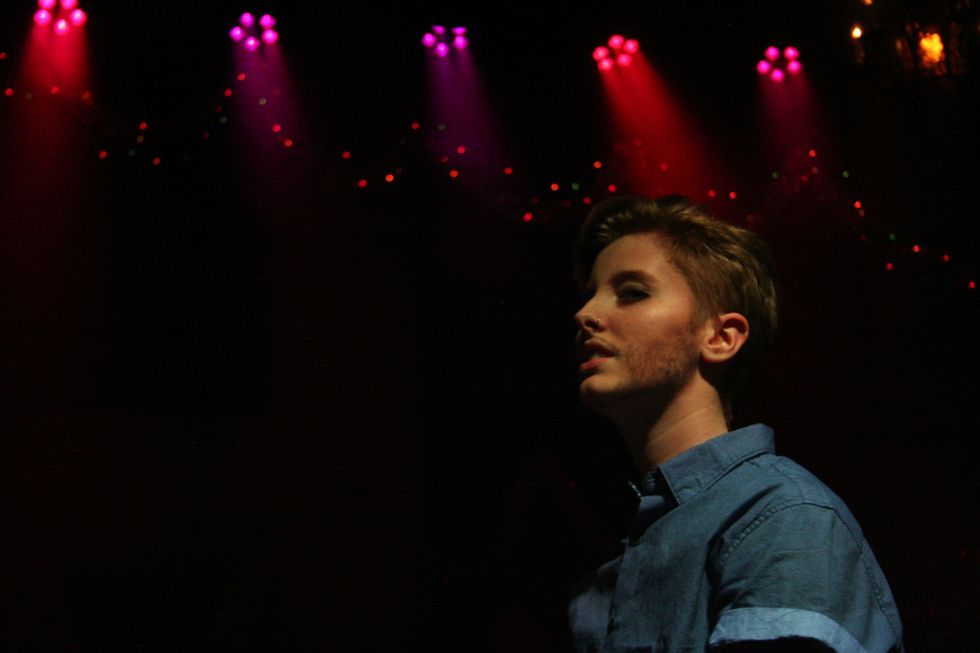
Ali Walker (@aliwalkerart)
I am currently a rising junior at Ithaca College in Ithaca, New York where I study sociology and women's and gender studies.
How do you identify? What are your pronouns?
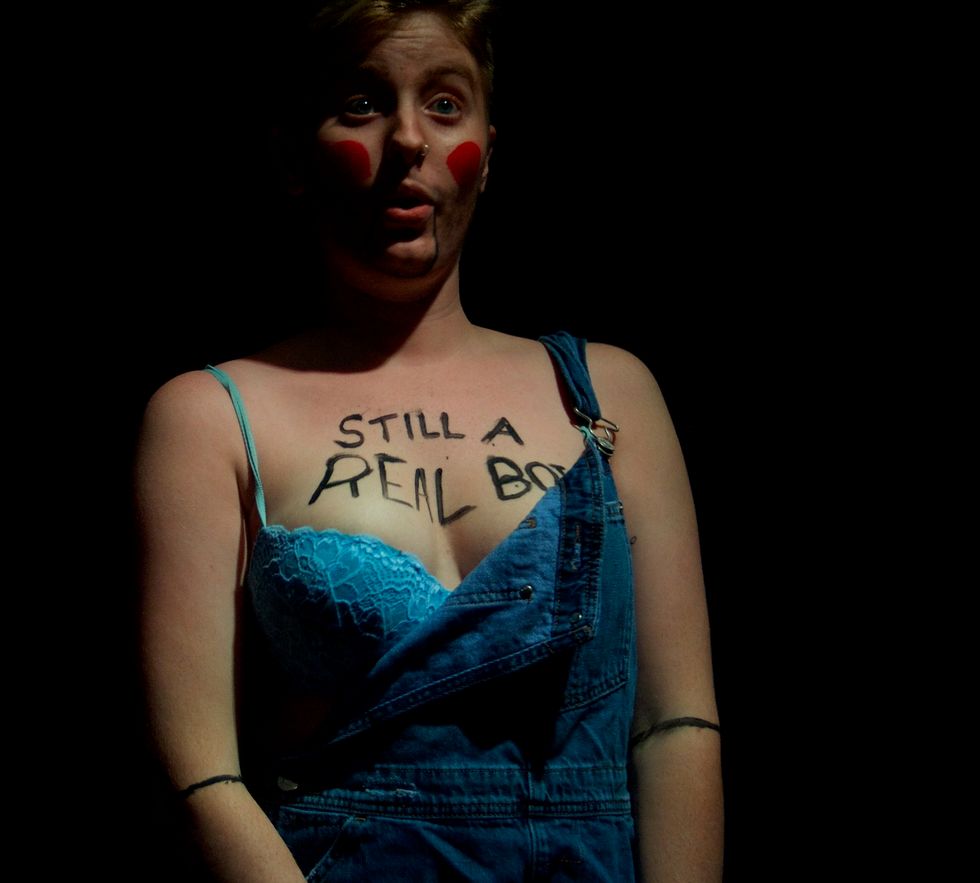
Ali Walker (@aliwalkerart)
As for gender, I am bigender/genderfluid which means I identify both as a woman and non-binary. I use they/them and she/her pronouns. As for sexual orientation, I identify as a lesbian.
What was your experience growing up queer in the south?
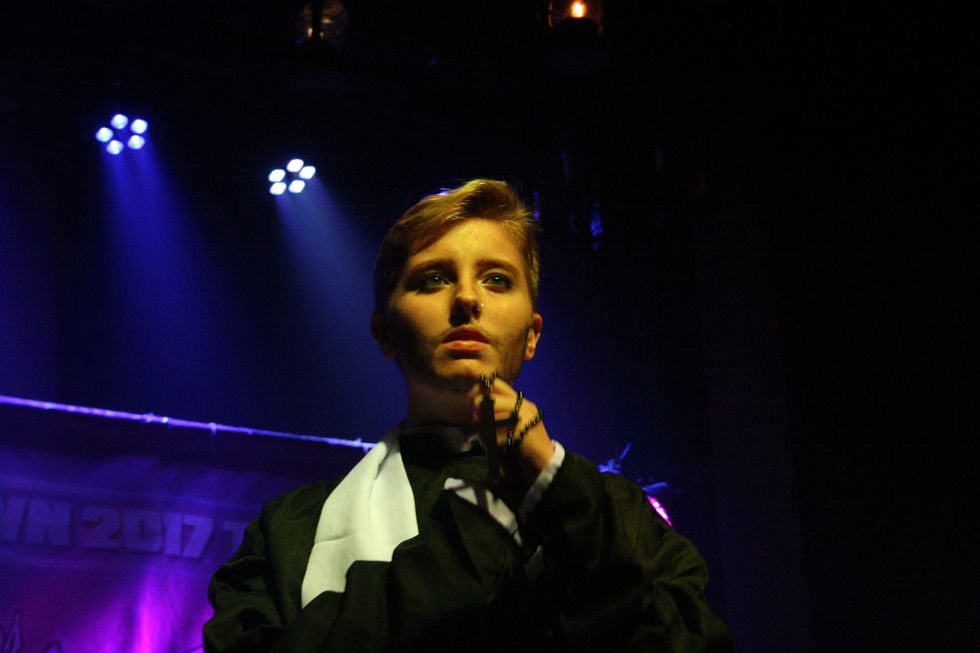
Ali Walker (@aliwalkerart)
It was quite a mixed bag for me. I grew up with many cis-normative and heteronormative expectations. I am the eldest child of my family so there was a lot of pressure for me to be a certain way: marry a man, have beautiful kids, have a career but stay focused on having a family. But, my mom had a gay hair stylist and my family mostly tolerated cisgender gay people. Just as long as they kept it to themselves. I internalized a lot of that and participated in a lot of compulsory heterosexuality, where I would have romantic and sexual relationships with men. I was serially monogamous, going from boyfriend to boyfriend, from age twelve to sixteen. I kept trying to fill a void that I didn't know how to fill. Boys seemed like an easy fix but something wasn't right.
I remember having crushes on girls when I was as young as 5 years old but always telling myself that it was wrong. It was never that someone told me specifically that being gay was wrong (that wasn't until I was a little older) but it was that I had always been told exclusively to pursue boys. Being attracted to women wasn't an option, as far as I knew. There was also an even deeper issue of internalized misogyny and fear of myself as a woman. I remember talking to someone about how one of her friends was bisexual and I said, "I don't know how someone could sleep with a girl. I don't even like myself 'down there' so how could I like another girl's 'down there'?" When I realized liking girls was an option, it was always passed off as girls kissing girls for attention, a fad. Or if a butch woman was involved, the butch woman was mean and ugly.
For my gender, I always felt much more masculine. I had a friend who expressed herself as a "tomboy" in elementary school and I really admired that. I wanted to wear boys' clothes and do things that boys would do, like wrestle or play football. However, I was told I couldn't do those things because I was a girl. Nevertheless, my mom allowed me to dress in boys' clothes for a while when I was about 8 or 9. For the short while that it lasted, I had never felt so at home in my own skin. My wardrobe change only lasted for two weeks before someone called me a "dyke" and an "ugly f*ggot freak." I told my grandmother about this and how I didn't know what those words meant. She told me that, "Those are ugly words to make gay people feel bad." And when I asked her if me being called those words meant I was gay, she said, "No, honey. You're too pretty and nice to be a lesbian."
From then on, I tried desperately to find my place in multiple brands of femininity that I felt would be desirable to men. I wanted so desperately to feel desired but also to hide my attraction towards women and my desire to look like the men that I thought I loved.
Many of the men I dated forced me to be more feminine to compliment their masculinity, even going so far to physically and sexually assault me to make sure I "stayed in my place" as a woman. Even though I would fight back, I would just get hurt worse the next time.
Of course being in the South, religion is a common theme in regards to one's sexuality and gender. So here's my experience with that realm:
My last boyfriend, we'll call him J, was two years older than me. I dated him when I was fifteen to sixteen years old. He was the main reason that I found myself "loving" Jesus since he dreamed of being a youth pastor and refused to date a girl who didn't love God as much as he did. But, he took care of me. My mother was getting a divorce from my then-stepdad and I didn't want to be home.
I had grown up going to church but I always resented it. I hated getting up in the morning to go. I thought it was incredibly boring. When I was old enough to listen to the sermon, my pastor said many things I didn't agree with and I felt myself rejecting the idea of a God when I was as young as ten. But, J insisted that I love God if he was to love me. So, I was "saved". I "fell in love with Jesus", just as J wanted me to. But, from then on, J used Christianity as an excuse to hurt me. We would pray together and he would tell me that God is loving and kind and wants the best for me but then would tell me that "This is what God wants." when he would rape me or guilt me into sex because my "job as a woman and potential-wife is to serve the man I love." This only made me hate myself even more and hate who I was because if I couldn't serve the man I love and enjoy sex with him, then I was a whore and sinner worth damnation for wanting women too.
This caused cognitive dissonance as I was also a strong ally for the LGBTQIA+ community, a community I learned to love through my involvement on Tumblr (aka the only place for queer kids to be out in the South).
I came out as a lesbian after I went to the South Carolina Governor's School for the Arts and Humanities. It was a bubble, for sure, but it is known as being a safe haven for queer kids in South Carolina. While there, I met my first girlfriend. She helped me realize that I wasn't broken and that being attracted to women was okay. I found a freedom for myself to be queer but I also found myself falling in love with myself and my body. By unpacking my struggle with my sexual orientation, I began to unpack all of the other things that I resented about myself, like my desire for sex, my body, and my intellect. In falling in love with girls, I fell in love with myself.
I didn't come out as non-binary until college. I knew people who identified as trans*, both binary and non-binary, in high school but was always a little apprehensive about exploring my own gender. Many of the friends who I met in college were going through gender questioning periods since many of us already identified as queer. I found myself finding myself in my friends' transitions. I started dressing more masculine and carrying myself more masculine. Finally, I cut my hair. My hair had been a big part of my identity for a long time. It was long, golden blonde, and beautiful. But, I finally cut it into a pixie. It was like a reverse story of Samson from the Bible: Samson lost his strength when he cut his hair. I gained my strength when I cut mine.
I was finally at home in my body again, like I was when I was allowed to wear boy clothes in 4th grade. I am butch as all hell and I f*cking love it.
I feel like I should make a note of how my family reacted when I came out. I first came out as bisexual. The very first time, I was 14 and asked my friend if she ever thought she was bi. She said, "I don't know. Not really," and I said, "Oh, really? I sometimes think I'm bi." I first came out to my mom when I was sixteen after I started dating my first girlfriend. We were doing our makeup and I looked up and said, "Hey… would you hate me if I was gay?" And she laughed and said, "No, of course not." So, I said, "Good, because I am." Then, I ran out of the bathroom before I could hear her response. Later, I told her about my girlfriend and ever since my mother has been very supportive. She has been my biggest ally in my coming out process. Even when I came out as non-binary, she supported me. Hell, when I started doing drag, she offered to help me with makeup and things. She is literally my rock.
The rest of my family wasn't as receptive. Many know how I identify but shut me down when I try to talk about it. Some even refuse to look at me or talk to me at family gatherings. It's a mixed bag. I've confronted many of them about it but others I feel unsafe confronting, such as my grandfather. He worships Reverend Billy Graham and has threatened to disown me if I were to ever get tattoos. Which is funny because I have 4 tattoos. But, I live in constant fear of what he would do if he ever found out I'm gay.
What was it like transitioning from living in SC to living in NY?

Joshua Jensen (@jjensen1031)
It was pretty hard but not too bad. I had lived in South Carolina my whole life. The cultural differences between Ithaca, New York, and Rock Hill, South Carolina took a lot of getting used to. And of course, moving over 700 miles away from home was scary, but I feel like I was able to cope rather well with the transition. I started living away from home at sixteen when I started attending Governor's School so being away from home wasn't really an issue for me. I chose Ithaca for its strong music program, as I initially came in as a Vocal Performance major, but what really drew me to the school and to the Ithaca, New York community was its presence of being a queer city and being relatively safe for queer folks. I immediately was able to find my people and a new chosen family.
I will say though, not to sound like a Southern stereotype, it was hard to leave the food of the South. Even though I'm vegan (like every other person in Ithaca) and can't eat a lot of the food in the South, one of my biggest struggles, when I moved up, was the lack of Bojangles.
What got you interested in drag?

Joshua Jensen (@jjensen1031)
I've always loved performing. I screamed for the first two years of my life because I couldn't stand for the attention to not be on me. Growing up I did theatre and started pursuing a career in music when I was in middle school and found out I could carry a tune. But when I got to college, I realized that a career in music was not for me. I loved music, singing, acting, and even music history and musicology but I felt that my true interests were elsewhere. I had been performing for a good chunk of my childhood and teenhood so I needed to find something else.
I made a really good friend my freshman year named Carter. They were also non-binary and a music major (they played viola, to be exact) so we, of course, became friends. Carter was a junior and acted as a mentor figure to me in my gender journey. They had an established career as a drag king, under the stage name Dragon Phoenix, on campus. One of the LGBTQIA+ student groups on campus, PRISM, put on a drag show every year and Carter had participated in it before. Since I was their "son", they suggested I should try it out and perform with them. Carter and some other drag kings on campus, such as King Boysenberry and Air Cn*t-ditioner, taught me how to do my makeup and how to walk a runway like a professional drag king. I was instantly hooked.
Soon after the PRISM show, I went to go see a drag show in town that one of my drag mothers, Alisha Day, was performing in. After the show, I talked to Alisha about how I was interested in doing more drag and she told me to speak to the folks who organized the show that she had just performed in called the House of Merlot. I sent their Facebook page a message, performed in their amateur show, and the rest is history. I was adopted into the House of Merlot and was connected to the world of queer theatre that I love so much today.I know I’ve personally never been exposed to drag, and only associated it with men crossdressing as women. What would you like people who have had similar experiences to know about drag?

Ali Walker (@aliwalkerart)
There is definitely more to drag than cis-men in wigs.
Drag, to me, is taking the idea that gender is a performance and then exploring gender through theatre and pushing expression boundaries to anywhere the performer chooses on the spectrum. It doesn't need to be sexual; it's an exploration. A queen who wants to wear a dress but also have a full beard is great. It is whatever the performer wants it to be. It questions "What is masculine? What is feminine?" It's supposed to challenge the cis-hetero patriarchy and say, "F*ck you!" to expectations of what is "right" and "wrong" for gender. Honestly, shameless plug, I think the House of Merlot does a good job of creating a space for this kind of artistic work.
What many people are exposed to is what I call the "RuPaul Drag," which is mostly cis-men wearing wigs, press on acrylic nails, and claiming to be exuding quintessential womanhood. They appropriate movement and language that originated in the ballroom scene of New York City, a scene that was created by and for queer and trans* people of color. Voguing and being in the ballroom scene could get people arrested or harassed until Madonna sang "Vogue" and then suddenly it was acceptable because a white lady did it. White gays took it over and appropriated the hell out of it.
Don't get me wrong, hyper-feminine drag is great, and RuPaul's Drag Race has been great for giving a highly visible platform to drag. However, I find it to be a little problematic.
I think the RuPaul style of drag is rooted in something known as "gender essentialism," which is the concept that certain things are associated with certain genders (for example, in order to be a true woman, one must have plentiful breasts and hips), not to mention the Western beauty standards that are upheld in this genre of drag. RuPaul himself has a history of saying blatantly transphobic things, proving that his drag isn't about the exploration of gender through theatre, but instead it is about mocking women and creating a caricature of femininity. It can be quite transmisogynistic.
Of course, that isn't limited to queens; I've seen kings be very misogynistic because the masculinity being expressed is often toxic, but that does not represent ALL drag performers.
Drag is fluid. It's challenging. It's beautiful. It's messy, and it's queer as all hell. What people are shown of it on a massive platform is the part that has been commodified, made profitable, and made safe for the consumption of cisgender and, surprisingly, heterosexual people. I just think of the meme of Tyra Banks where she's like "Hoe, but make it fashion" but instead it's "The queer community, but make it easy to swallow."
How do you go about crafting your performances?
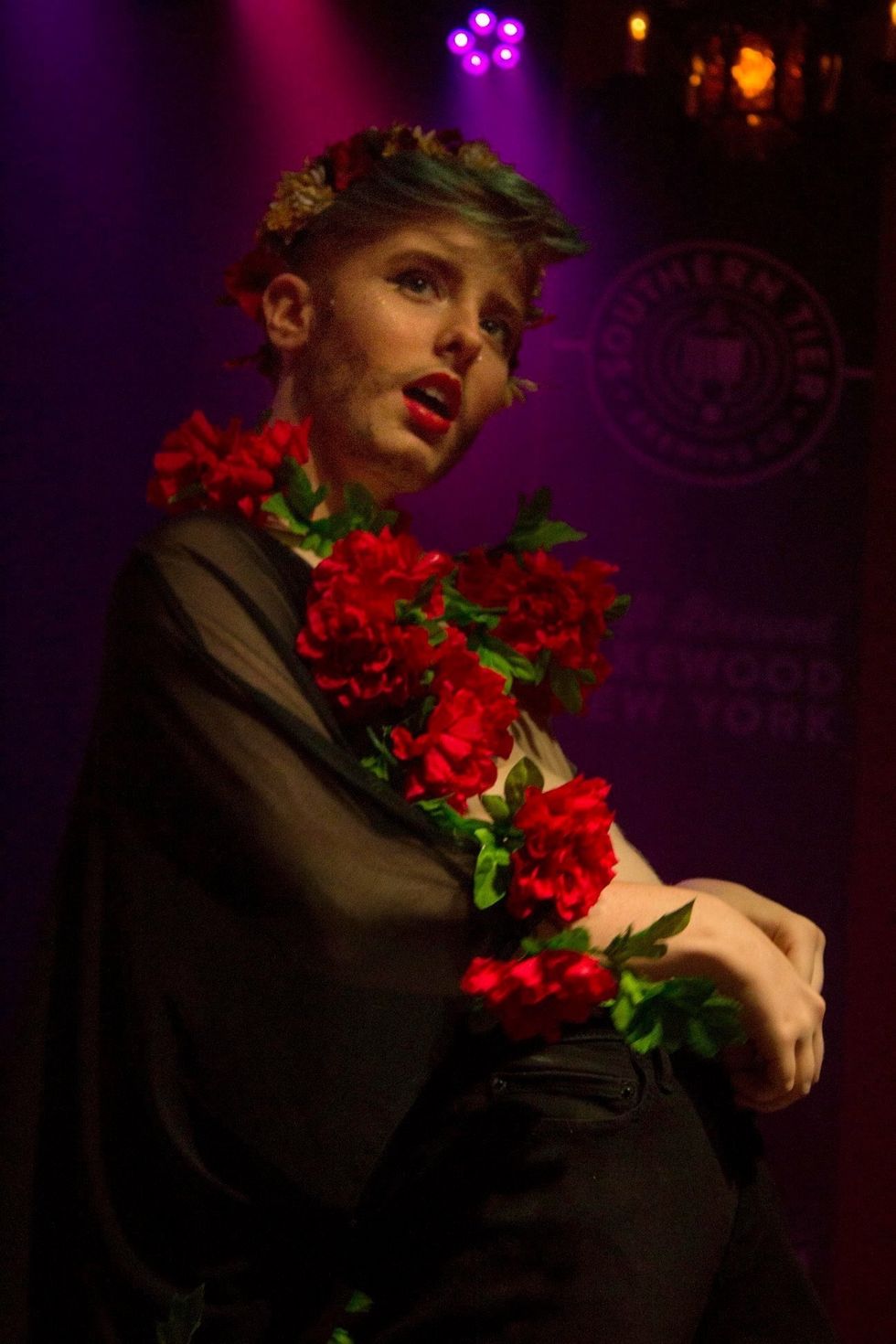
Joshua Jensen (@jjensen1031)
So, I can't dance to save my damn life. Since I can't dance, I find songs and I think of stories to tell with them through movement, acting, and incorporating other sound clips into the mix. One of my best numbers is a number that I do while lip syncing to "Judas" by Lady Gaga. The number starts out with a clip of a homophobic sermon by a Southern Baptist pastor. Then, it transitions to a pause in which I put down my Bible and pick up a gay porn magazine. During the song, I show the pastor's struggle of "I love God. But, I'm gay as f*ck and I just want to be f*cked by a man." A lot of my numbers are like this: centered around storytelling.
I also like to challenge people with my stories and highlight marginalized voices, especially voices that are marginalized within the LGBTQIA+ community. I often perform with other kings when I do numbers that are based around sexuality. I've been told by many trans* masculine audience members that those numbers make them feel good about being trans* masculine and being attracted to men and masculinity. That's always a very powerful moment when someone can find themselves in the art that you produce.
I consider myself an artist and I think as artists we carry a lot of responsibility. We carry the responsibility of expressing ourselves but also serving an audience. That doesn't mean to change one's art to fit a certain audience. Instead, our job is to show our truths and to give a platform to the truths of others. By being true to my story, to my identity, and to my creative vulnerability, I serve my need of sharing myself but also acting as a mirror for my audience to finally see themselves, especially since we queer folks rarely see ourselves represented anywhere.
As far as costumes and makeup go, I spend about 2 hours on makeup before every gig. I may style my hair a little but I mostly focus on my makeup. I try to blend elements of what is considered feminine and masculine. I wear sparkly eyeshadow and winged eyeliner with glitter highlight but I also contour my face to be masculine and always paint on some sort of facial hair.
My costumes aren't big and extravagant. Mostly because a butch is broke as hell and doesn't know how to sew. I think the most extravagant I've ever gone was wearing lingerie on stage a few times for more burlesque-style numbers. A lot of my inspiration comes from the theatre and not all costumes in theatre require glitter or need to be designed by a high-end fashion designer. Normally, I put together a more realistic outfit out of my own everyday street clothes that fit the character I have developed. If the number calls for something more "extra," I will typically thrift for garments and paint them to add pizazz, such as my Keith Haring-inspired costume with Keith Haring style patterned shorts and shirt.
Do you have any advice for queer kids in the south, like those who are struggling with conservative families?
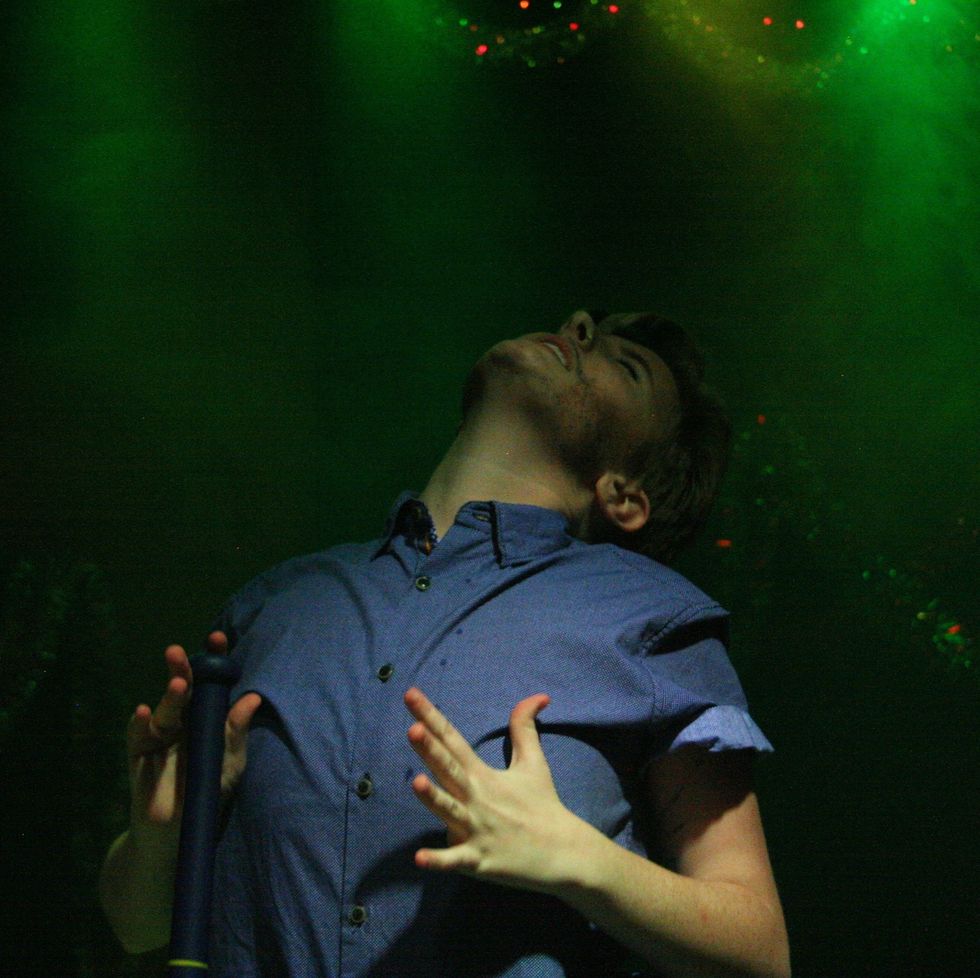
Ali Walker (@aliwalkerart)
Two words: stay strong. I know our resources are limited, especially for us folks who didn't grow up affluent or in areas with LGBT centers. But there is a whole community, whether you find it online or in person, that is there to support you. You are loved.
Demand respect. Tolerance is fine but you deserve to be fully respected. You are a human being worth unconditional love and respect. You are absolutely not broken, you are absolutely not a sinner, and you are absolutely lovable. And it's totally okay to ask for your needs to be met in relationships, whether platonic, romantic, or familial. If you feel that you are not being respected, it is okay to demand more respect. It is okay to be selfish. You do not need to apologize or change yourself to be more acceptable.
But also, safety is important. Be proud but be safe. Assess if your friends/family would be willing to learn or if there is any threat posed if you were to come out. It's okay to be partially out. There is no obligation to be out to everyone if it would compromise your safety.
Finally, and this something I continue to tell myself today, blood might be thicker than water but maple syrup is thicker than blood. It sounds silly but it basically means that family is important, sure, but blood doesn't matter if those who share blood relation to you are toxic and/or hurt you. Sometimes chosen families are the best and provide the healthiest love. 



















